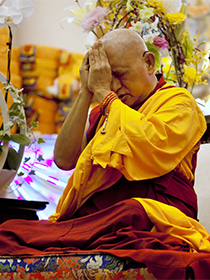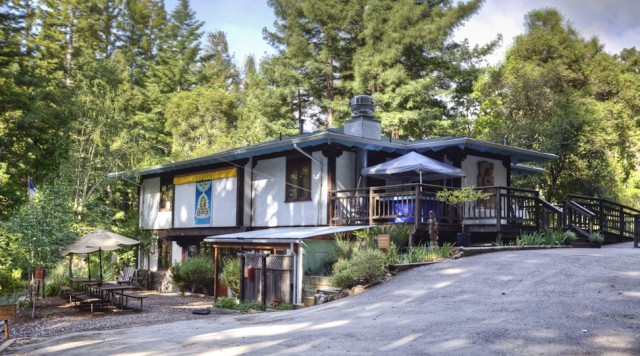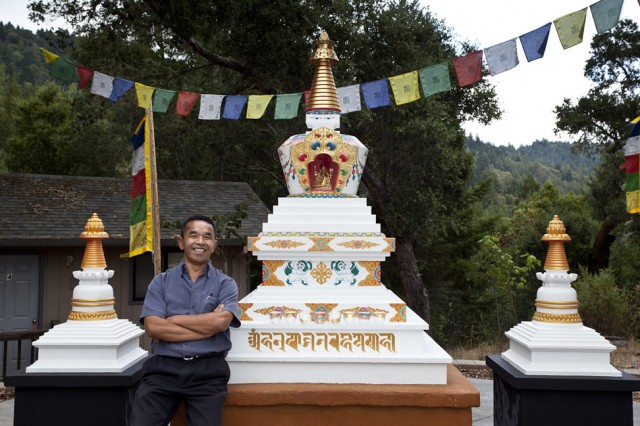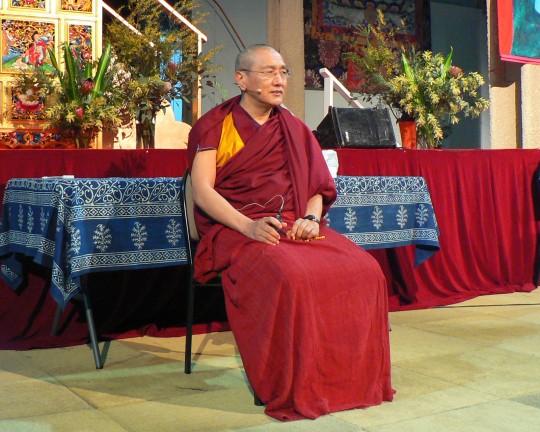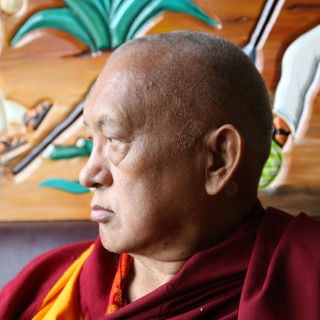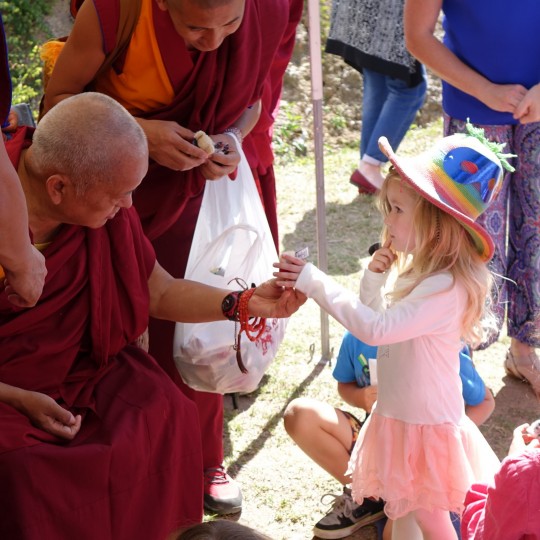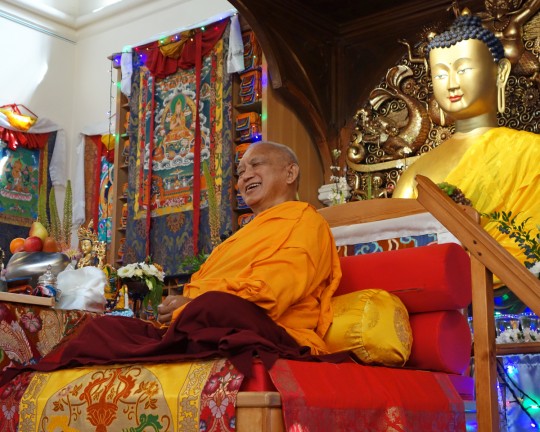- Home
- FPMT Homepage
Foundation for the Preservation of the Mahayana Tradition
The FPMT is an organization devoted to preserving and spreading Mahayana Buddhism worldwide by creating opportunities to listen, reflect, meditate, practice and actualize the unmistaken teachings of the Buddha and based on that experience spreading the Dharma to sentient beings. We provide integrated education through which people’s minds and hearts can be transformed into their highest potential for the benefit of others, inspired by an attitude of universal responsibility and service. We are committed to creating harmonious environments and helping all beings develop their full potential of infinite wisdom and compassion. Our organization is based on the Buddhist tradition of Lama Tsongkhapa of Tibet as taught to us by our founders Lama Thubten Yeshe and Lama Thubten Zopa Rinpoche.
- Willkommen
Die Stiftung zur Erhaltung der Mahayana Tradition (FPMT) ist eine Organisation, die sich weltweit für die Erhaltung und Verbreitung des Mahayana-Buddhismus einsetzt, indem sie Möglichkeiten schafft, den makellosen Lehren des Buddha zuzuhören, über sie zur reflektieren und zu meditieren und auf der Grundlage dieser Erfahrung das Dharma unter den Lebewesen zu verbreiten.
Wir bieten integrierte Schulungswege an, durch denen der Geist und das Herz der Menschen in ihr höchstes Potential verwandelt werden zum Wohl der anderen – inspiriert durch eine Haltung der universellen Verantwortung und dem Wunsch zu dienen. Wir haben uns verpflichtet, harmonische Umgebungen zu schaffen und allen Wesen zu helfen, ihr volles Potenzial unendlicher Weisheit und grenzenlosen Mitgefühls zu verwirklichen.
Unsere Organisation basiert auf der buddhistischen Tradition von Lama Tsongkhapa von Tibet, so wie sie uns von unseren Gründern Lama Thubten Yeshe und Lama Thubten Zopa Rinpoche gelehrt wird.
- Bienvenidos
La Fundación para la preservación de la tradición Mahayana (FPMT) es una organización que se dedica a preservar y difundir el budismo Mahayana en todo el mundo, creando oportunidades para escuchar, reflexionar, meditar, practicar y actualizar las enseñanzas inconfundibles de Buda y en base a esa experiencia difundir el Dharma a los seres.
Proporcionamos una educación integrada a través de la cual las mentes y los corazones de las personas se pueden transformar en su mayor potencial para el beneficio de los demás, inspirados por una actitud de responsabilidad y servicio universales. Estamos comprometidos a crear ambientes armoniosos y ayudar a todos los seres a desarrollar todo su potencial de infinita sabiduría y compasión.
Nuestra organización se basa en la tradición budista de Lama Tsongkhapa del Tíbet como nos lo enseñaron nuestros fundadores Lama Thubten Yeshe y Lama Zopa Rinpoche.
A continuación puede ver una lista de los centros y sus páginas web en su lengua preferida.
- Bienvenue
L’organisation de la FPMT a pour vocation la préservation et la diffusion du bouddhisme du mahayana dans le monde entier. Elle offre l’opportunité d’écouter, de réfléchir, de méditer, de pratiquer et de réaliser les enseignements excellents du Bouddha, pour ensuite transmettre le Dharma à tous les êtres. Nous proposons une formation intégrée grâce à laquelle le cœur et l’esprit de chacun peuvent accomplir leur potentiel le plus élevé pour le bien d’autrui, inspirés par le sens du service et une responsabilité universelle. Nous nous engageons à créer un environnement harmonieux et à aider tous les êtres à épanouir leur potentiel illimité de compassion et de sagesse. Notre organisation s’appuie sur la tradition guéloukpa de Lama Tsongkhapa du Tibet, telle qu’elle a été enseignée par nos fondateurs Lama Thoubtèn Yéshé et Lama Zopa Rinpoché.
Visitez le site de notre Editions Mahayana pour les traductions, conseils et nouvelles du Bureau international en français.
Voici une liste de centres et de leurs sites dans votre langue préférée
- Benvenuto
L’FPMT è un organizzazione il cui scopo è preservare e diffondere il Buddhismo Mahayana nel mondo, creando occasioni di ascolto, riflessione, meditazione e pratica dei perfetti insegnamenti del Buddha, al fine di attualizzare e diffondere il Dharma fra tutti gli esseri senzienti.
Offriamo un’educazione integrata, che può trasformare la mente e i cuori delle persone nel loro massimo potenziale, per il beneficio di tutti gli esseri, ispirati da un’attitudine di responsabilità universale e di servizio.
Il nostro obiettivo è quello di creare contesti armoniosi e aiutare tutti gli esseri a sviluppare in modo completo le proprie potenzialità di infinita saggezza e compassione.
La nostra organizzazione si basa sulla tradizione buddhista di Lama Tsongkhapa del Tibet, così come ci è stata insegnata dai nostri fondatori Lama Thubten Yeshe e Lama Zopa Rinpoche.
Di seguito potete trovare un elenco dei centri e dei loro siti nella lingua da voi prescelta.
- 欢迎 / 歡迎
简体中文
“护持大乘法脉基金会”( 英文简称:FPMT。全名:Foundation for the Preservation of the Mahayana Tradition) 是一个致力于护持和弘扬大乘佛法的国际佛教组织。我们提供听闻,思维,禅修,修行和实证佛陀无误教法的机会,以便让一切众生都能够享受佛法的指引和滋润。
我们全力创造和谐融洽的环境, 为人们提供解行并重的完整佛法教育,以便启发内在的环宇悲心及责任心,并开发内心所蕴藏的巨大潜能 — 无限的智慧与悲心 — 以便利益和服务一切有情。
FPMT的创办人是图腾耶喜喇嘛和喇嘛梭巴仁波切。我们所修习的是由两位上师所教导的,西藏喀巴大师的佛法传承。
繁體中文
護持大乘法脈基金會”( 英文簡稱:FPMT。全名:Found
ation for the Preservation of the Mahayana Tradition ) 是一個致力於護持和弘揚大乘佛法的國際佛教組織。我們提供聽聞, 思維,禪修,修行和實證佛陀無誤教法的機會,以便讓一切眾生都能 夠享受佛法的指引和滋潤。 我們全力創造和諧融洽的環境,
為人們提供解行並重的完整佛法教育,以便啟發內在的環宇悲心及責 任心,並開發內心所蘊藏的巨大潛能 — 無限的智慧與悲心 – – 以便利益和服務一切有情。 FPMT的創辦人是圖騰耶喜喇嘛和喇嘛梭巴仁波切。
我們所修習的是由兩位上師所教導的,西藏喀巴大師的佛法傳承。 察看道场信息:
- FPMT Homepage
- News/Media
-
- Study & Practice
-
-
- About FPMT Education Services
- Latest News
- Programs
- New to Buddhism?
- Buddhist Mind Science: Activating Your Potential
- Heart Advice for Death and Dying
- Discovering Buddhism
- Living in the Path
- Exploring Buddhism
- FPMT Basic Program
- FPMT Masters Program
- FPMT In-Depth Meditation Training
- Maitripa College
- Lotsawa Rinchen Zangpo Translator Program
- Universal Education for Compassion & Wisdom
- Online Learning Center
-
- Prayers & Practice Materials
- Overview of Prayers & Practices
- Full Catalogue of Prayers & Practice Materials
- Explore Popular Topics
- Benefiting Animals
- Chenrezig Resources
- Death & Dying Resources
- Lama Chopa (Guru Puja)
- Lama Zopa Rinpoche: Compendium of Precious Instructions
- Lama Zopa Rinpoche: Life Practice Advice
- Lama Zopa Rinpoche Practice Series
- Lamrim Resources
- Mantras
- Prayer Book Updates
- Purification Practices
- Sutras
- Thought Transformation (Lojong)
- Audio Materials
- Dharma Dates - Tibetan Calendar
- Translation Services
- Publishing Services
- Ways to Offer Support
- Prayers & Practice Materials
-
- Teachings and Advice
- Find Teachings and Advice
- Lama Zopa Rinpoche Advice Page
- Lama Zopa Rinpoche: Compendium of Precious Instructions
- Lama Zopa Rinpoche Video Teachings
- ༧སྐྱབས་རྗེ་བཟོད་པ་རིན་པོ་ཆེ་མཆོག་ནས་སྩལ་བའི་བཀའ་སློབ་བརྙན་འཕྲིན།
- Podcasts
- Lama Yeshe Wisdom Archive
- Buddhism FAQ
- Dharma for Young People
- Resources on Holy Objects
- Teachings and Advice
-
-
*If a menu item has a submenu clicking once will expand the menu clicking twice will open the page.
-
-
- Centers
-
- Teachers
-
- Projects
-
-
-
-
*If a menu item has a submenu clicking once will expand the menu clicking twice will open the page.
-
-
- FPMT
-
-
-
-
-
Many times we mix our compassion with attachment. We begin with compassion, but after some time, attachment mixes in and then it becomes an attachment trip.
Lama Thubten Yeshe
-
-
-
- Shop
-
-
-
The Foundation Store is FPMT’s online shop and features a vast selection of Buddhist study and practice materials written or recommended by our lineage gurus. These items include homestudy programs, prayers and practices in PDF or eBook format, materials for children, and other resources to support practitioners.
Items displayed in the shop are made available for Dharma practice and educational purposes, and never for the purpose of profiting from their sale. Please read FPMT Foundation Store Policy Regarding Dharma Items for more information.
-
-
Mandala
Vajrapani Institute in Boulder Creek, California continues its experiment with “no-fees” Kopan West lam-rim retreats, the next scheduled for November 21-30, 2014 and taught by FPMT-registered teacher Glen Svensson. Kopan West is a 10-day introductory lam-rim course modeled after the successful Kopan November retreats held in Nepal since the early 1970s.
In 2013, the center piloted a new generosity-based system for covering the retreat’s costs, abandoning the traditional fee-centered model. They told participants they would not be charged and asked them at the end of the retreat to instead reflect on what they had gained and make a contribution to next year’s attendees.
“The teachings from Kopan West continue to impact me as I apply Buddhist practices in my daily life and has inspired me to further study,” said Sahar Bintamal, a November 2013 retreatant. “My attendance at Kopan West would not have been possible without the donation/generosity model. I feel honored that my donation will support another student to experience the lam-rim teachings in the coming year.”
Mandala brings you news of Lama Zopa Rinpoche and of activities, teachings and events from over 160 FPMT centers, projects and services around the globe. If you like what you read on Mandala, consider becoming a Friend of FPMT, which supports our work.
- Tagged: kopan west, vajrapani institute
- 0
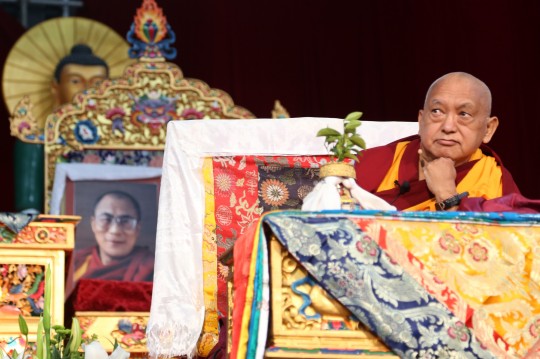
Lama Zopa Rinpoche giving the preliminary teaching before the long life initiation during the CPMT 2014 meeting, Great Stupa of Universal Compassion, Australia, September 17, 2014. Photo by Ven. Thubten Kunsang.
Lama Zopa Rinpoche gave an exhilarating teaching on the merely labeled ‘I’ and emptiness during the preliminary teachings for the Amitayus long life initiation given during the CPMT 2014 meeting in Australia. A recording of the teaching is now available on the CPMT livestream page.
Rinpoche will be webcast live giving the concluding talk and dedication of the CPMT 2014 meeting on Thursday, September 18, at 4 p.m. AEST (UTC+10).
Here’s an excerpt from a long letter Rinpoche dictated to Ven. Holly Ansett in 2008, published on the Lama Yeshe Wisdom Archive, with extensive advice on emptiness and the merely imputed ‘I’. Rinpoche advised:
“… The I, or the self, action and object are dependent arisings. The I exists being imputed in dependence upon its base, the aggregates. Here aggregates refers to form, feeling, recognition, compounded aggregates and consciousness. The I exists in dependence upon the aggregates; the I is merely imputed to the base, the aggregates, which exist in mere name. So, the I is empty of existing from its own side, empty of existing by its nature; it does not exist inherently.
“It is the same with any action. How an action actually exists is as a dependent arising. It is not independent, but a dependent arising. ‘Action’ is labeled on what the body, speech or mind does. It exists, but dependently. Any action, no matter what name it is given, is merely imputed by the mind. It is not independent, but a dependent arising. Action does not exist from its own side; it does not exist by its nature; it does not exist inherently, or truly.
“It is the same with any object. In dependence upon the base and the thought, something is labeled ‘object.’ The object came from the mind, not from the base. You could say that it exists from the side of the mind, or in dependence upon the mind, which imputes, or designates, it. But it also exists in relation to its base. So, it is the same with an object: it does not exist from its own side.
“Therefore, I, action and object are all totally empty. They are not nonexistent, which is nihilism, but they do not exist from their own side. They do exist from the side of the mind in relation to the base, but they do not exist from their own side. Therefore, they are totally empty from their own side. This is the same with all the rest of phenomena. Nothing exists from its own side. While they exist, all phenomena are totally empty of existing from their own side. They exist in mere name and function in mere name, but that doesn’t mean that they are nonexistent.
“This is a very subtle explanation of how the I, action, object and all other phenomena exist. It can be explained in a gross way, but here this is an extremely subtle explanation. Phenomena exist in mere name, being merely imputed by the mind. Here one needs to study and one needs to analyze, which means really check how things exist. …”
The complete advice “The Merely Imputed I” is part of “Lama Zopa Rinpoche’s Online Advice Book” on the website of Lama Yeshe Wisdom Archive.
Mandala will be covering the CPMT meeting with daily updates and new photos.
More information, photos and updates about FPMT spiritual director Lama Zopa Rinpoche can be found on Rinpoche’s webpage. If you’d like to receive news of Lama Zopa Rinpoche via email, sign up to Lama Zopa Rinpoche News.
17
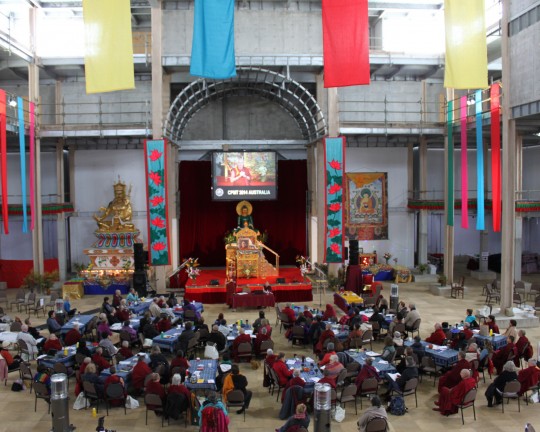
Ven. Roger Kunsang and Ven. Holly Ansett during a presentation on Day 4 of CPMT 2014, Great Stupa of Universal Compassion, Victoria, Australia, September 16, 2014. Photo by Laura Miller.
Day 4 of the CPMT 2014 meeting began with Lama Zopa Rinpoche leading the morning motivation in the Great Stupa of Universal Compassion. (A video recording of this is available on the CPMT Livestream page.) It was the perfect start to a busy and chilly day.
After breakfast, the North America regional coordinator Drolkar McCallum shared her experience with the Inner Job Description (IJD), explaining how she’s “fallen in love” with doing the practice. She then led participants through a short reflection on listening, part of the developing skillful communications section of the IJD.
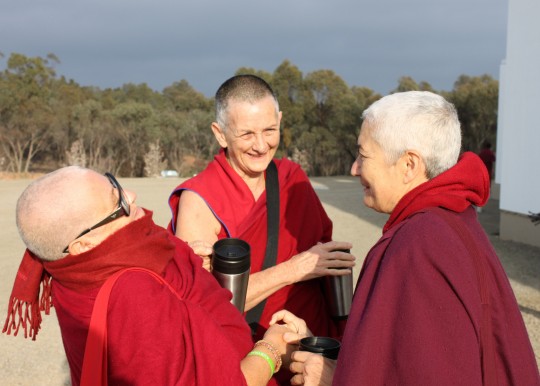
Vens. Siliana, Trisha and Paloma outside the Great Stupa of Universal Compassion, Australia, September 16, 2014. Photo by Laura Miller.
Ven. Roger Kunsang, CEO of FPMT, and Ven. Holly Ansett, FPMT charitable projects coordinator, spoke on Lama Zopa Rinpoche’s Vast Visions and the Five Pillars of Service. “The organization is about giving value or meaning to an individual’s life — giving us a clear understanding of our purpose of being,” Ven. Roger said as a way of orienting his presentation. “That’s what we do. That’s who we are. You can’t underestimate it. And I haven’t found anything better to do. The difference we’ve made in the world up to today, I’d say, it’s huge.” Lama Zopa Rinpoche arrived as Ven. Roger talked about the importance of Lama Yeshe and Lama Zopa Rinpoche to the work of FPMT and the importance of everyone offering service to FPMT and to the Lamas.
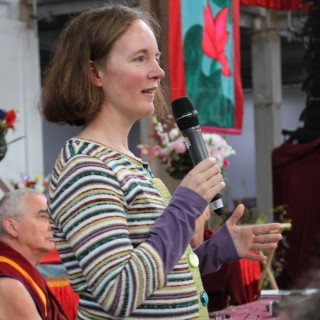
Linda Gyatso speaking on Day 4 at CPMT 2014, Great Stupa of Universal Compassion, Australia, September 16, 2014. Photo by Laura Miller.
Ven. Holly Ansett presented Lama Zopa Rinpoche’s Vast Visions for FPMT, describing the story behind it and its development with Rinpoche adding in commentary throughout. Ven. Holly described how much amazing work has already been done to actualize Rinpoche’s expansive wishes.
Linda Gyatso, the new director of the Foundation for Developing Compassion and Wisdom, introduced the organization. Linda explained that FDCW helps to develop and promote Universal Education for Compassion and Wisdom, the secular education programs and initiatives that have grown out of a vision articulated by Lama Yeshe.
After a tea break, Ven. Roger offered more insight into the importance of good local governance, emphasizing the critical role of a well-organized and educated local board of directors. He then discussed how the Five Pillars of Service are a way of translating the vast visions into goals to which centers can aspire that engage their communities most broadly. The Five Pillars are:
- Dharma
- Universal Education for Compassion and Wisdom
- Social and/or community service
- Interfaith activities
- Revenue generation activities
He explained that this isn’t new in the sense that many centers, projects and services are already engaged in many of these pillars.
Francois Lecointre, director of Institut Vajra Yogini (IVY) in France; Denise Macy, director of Land of Medicine Buddha (LMB) in California, US; and Fabienne Pradelle, director of Vajrapani Institute in California, explained how the work of their respective centers matches up with the Five Pillars.
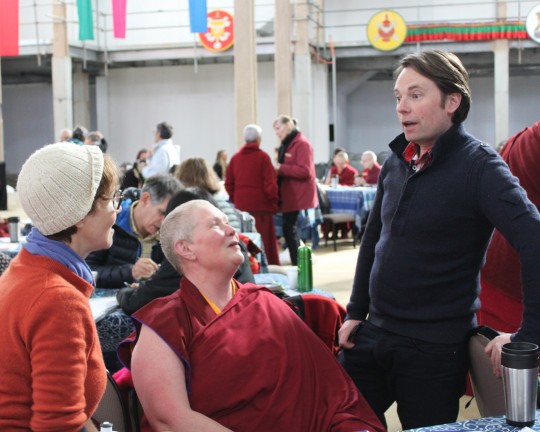
Wendy Cook, Ven. Lindy, Matthew Poxon during tea break on Day 4 at the Great Stupa of Universal Compassion, Australia, September 16, 2014. Photo by Laura Miller.
After a tasty lunch, three panelists addressed an issue critical for the development and growth of centers, projects and services in the session “Developing Fund Raising and Revenue Generation.”
Hup Cheng Tan, center director of Amitabha Buddhist Centre in Singapore, explained how ABC makes extensive offerings, hosts festivals and creates many, many activities for students to make offerings and to offer sponsorships. For many present, the scope and results of ABC’s activities were mind blowing. Hup Cheng also mentioned that ABC has a retail shop and used feng shui when designing their building, but emphasized that generosity and merit generation were at the heart of their revenue generation work.
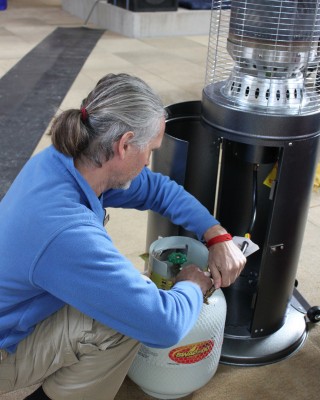
Harald Weichart helps change the fuel for the space heaters at CPMT 2014, Great Stupa of Universal Compassion, Australia, September 16, 2014. Photo by Laura Miller.
Tony Steel, center director of Vajrayana Institute, Sydney, Australia, explained how the center started to organize and host large conferences as a form of revenue generation, specifically “Happiness & Its Causes,” which has had His Holiness the Dalai Lama as a featured speaker, and also the conference “Mind & Its Potential.” Tony explained that he has drawn on his background in business while leading the center’s work in this area. As a way to evolve, Vajrayana is trying a new initiative: organizing exhibition events that generate money through selling sponsorships and exhibition space. They are currently working on one focused on wellness.
Sarah Brooks, spiritual program coordinator of Kadampa Center in Raleigh, North Carolina, US, explained how Kadampa Center operates on a donation only basis. She explained that at first the center tried raising funds by asking for a specific donation at events, but now they have no suggested donation, letting attendees decide their level of contribution. They also offer opportunities to sponsor teachers, pujas and holy days. Since they’ve moved to this model, they have been receiving more donations than before. The center also encourages students to set up a regular, automatic monthly donation, instead of trying to raise money with once a year type fundraising campaign. The center also makes sure to emphasize the practice of generosity and to show sincere gratitude to donors and active community members.
Ven. Holly was then invited to briefly list all of the incredible merit-generating activities that are being done through the FPMT Puja Fund. All present took a moment to rejoice in the beneficial activities being supported by this fund.
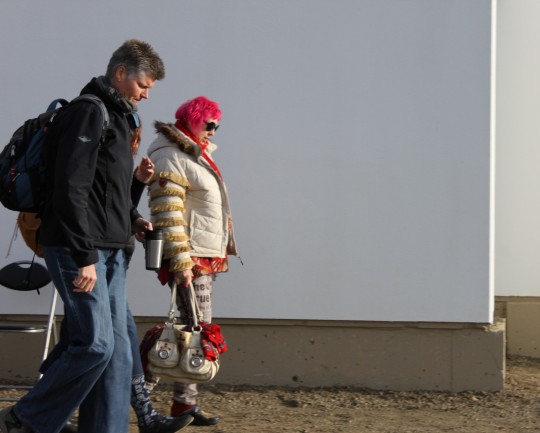
Jane Willis and Miffi Maximillion from Langri Tangpa Centre outside of the Great Stupa of Universal Compassion, Australia, September 16, 2014. Photo by Laura Miller.
At this point, the session was opened up to questions and sharing from the audience. Andy Wistreich from Land of Joy, a project to create a retreat center in the UK, announced that the project is completing the purchase of the property that they had found in northern England. In July 2014, Rinpoche visited and blessed the land.
“You create the merit and the money will come,” Andy explained. “It’s very important to not worry about money; worry about merit.” He continued that if you or your center asks Rinpoche a very specific question about creating merit for your project, you will get very specific advice. And if you properly carry out the advice, the money will come. He also said that Land of Joy hopes to employ a generosity model.
Denise Macy, from LMB, described some of her experiences with undertaking large projects and talked about a recent fundraising campaign. Members of the LMB community turned their very large prayer wheel continuously for 24 hours and exceeded their fundraising goals. She emphasized the importance of a “can do” attitude and a willingness to take a risk.
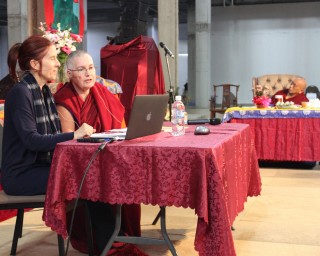
Ven. Chantal Carrerot and Drolkar McCallum leading a presentation on International Mahayana Institute with Lama Zopa Rinpoche listening on, CPMT 2014 Day 4, Great Stupa of Universal Compassion, Australia, September 2014. Photo by Laura Miller.
Miffi Maximillion, spiritual program director of Langri Tangpa Centre in Brisbane, Australia, explained the center’s popular “prostrate-a-thon,” in which participants took pledges for doing prostration for world peace. She said they saw the event primarily as a merit raising event and had “heaps of offerings” in the center during the event. In addition to creating merit, Miffi said the event also created a great community feeling.
Ven. Chantal Carrerot director of International Mahayana Institute (IMI) and Drolkar McCallum led a presentation on IMI, the community of FPMT’s monks and nuns. Ven. Chantal described the more than 40-year history of IMI and their invaluable contribution to building the international FPMT mandala; they were the “pioneers.” As of today, IMI had 280 Sangha members in 29 countries who are in retreat, studying, teachings and offering service. Participants talked with partners at their tables about the centers, projects and services that they knew of that have benefited from Sangha involvement. There were no shortage of instances to discuss. Then everyone took a few minutes to rejoice in all the activities of IMI Sangha members.
Drolkar then described current and future projects to support Sangha, drawing attention to the Lama Yeshe Sangha Fund. Afterwards, small groups gathered to discuss issues on Sangha and reported back to the large group.
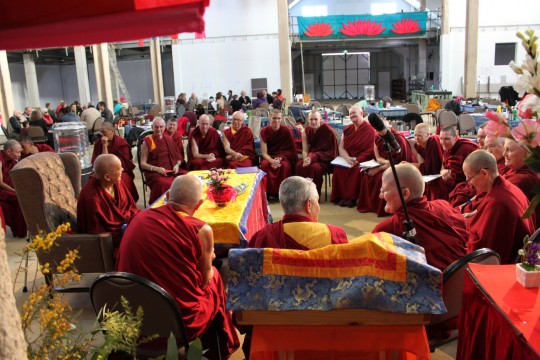
IMI Sangha members meeting with Rinpoche during the small group discussion period at CPMT 2014 Day 4, Great Stupa of Universal Compassion, Australia, September 16, 2014. Photo by Laura Miller.
Drolkar also led the end of day reflection, asking participants how they did with their practice of listening. “Was your listening unbiased? … Was it patient? … Did you listen with interest?” she asked. Lama Zopa Rinpoche, who had observed in most of the day’s meeting, led the dedication.
After dinner, Ven. Paloma Alba and Gun Cissé shared their stories about meeting the Dharma as part of the evening’s Wisdom Culture program. Like previous evenings’ presentations, despite the draft and chill in the stupa, their stories warmed the audience with laughter and inspiration.
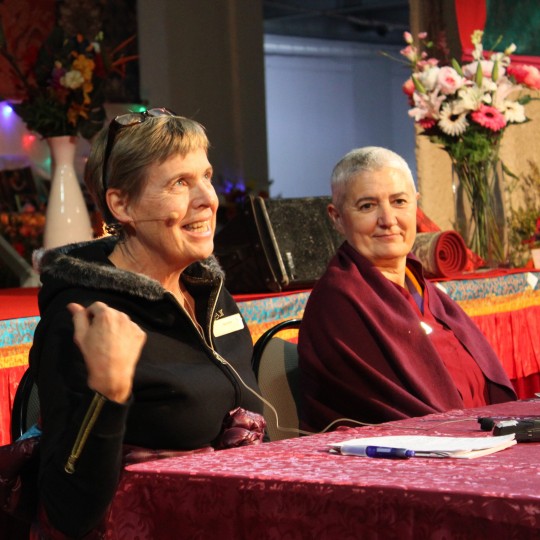
Ven. Paloma and Gun Cissé sharing their stories of meeting the Dharma, Day 4 CPMT 2014, Australia, September 16, 2014. Photo by Laura Miller.
Mandala will continue sharing updates and photos from the CPMT 2014 meeting as the meeting continues.
Mandala brings you news of Lama Zopa Rinpoche and of activities, teachings and events from over 160 FPMT centers, projects and services around the globe. If you like what you read on Mandala, consider becoming a Friend of FPMT, which supports our work.
14
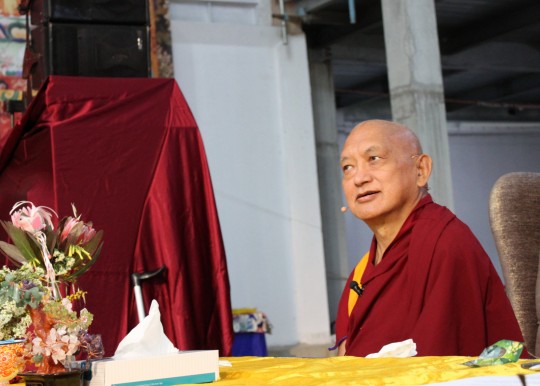
Lama Zopa Rinpoche listening to a question during CPMT 2014, Great Stupa of Universal Compassion, Australia, September 2014. Photo by Laura Miller.
Lama Zopa Rinpoche arrived at the Great Stupa of Universal Compassion during the morning tea break on the second day (September 14) of the CPMT 2014 meeting, currently being held at the Great Stupa of Universal Compassion in Australia. After tea, Rinpoche joined a small group discussion on the proposed idea for an international FPMT Advisory Council. After lunch Rinpoche attended the presentation on FPMT Education Programs and participated in a small group discussion on the topic. Rinpoche then had an open question and answer session with participants.
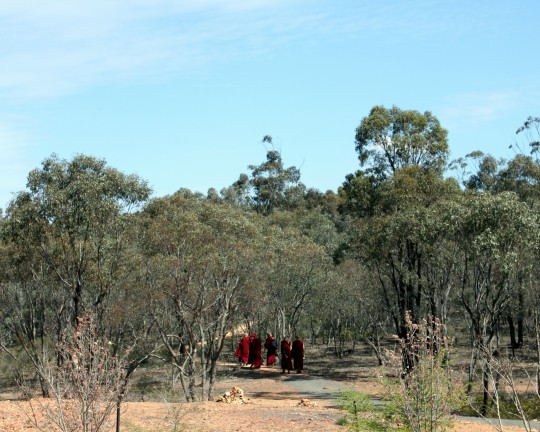
Lama Zopa Rinpoche following the path from the Great Stupa of Universal Compassion to Thubten Shedrup Ling, Victoria, Australia, September 14, 2014. Photo by Laura Miller.
For more on CPMT 2014, visit Mandala’s blog.
Lama Zopa Rinpoche is the spiritual director of the Foundation for the Preservation of Mahayana Tradition (FPMT), a Tibetan Buddhist organization dedicated to the transmission of the Mahayana Buddhist tradition and values worldwide through teaching, meditation and community service.
- Tagged: cpmt, cpmt 2014, lama zopa rinpoche
- 0
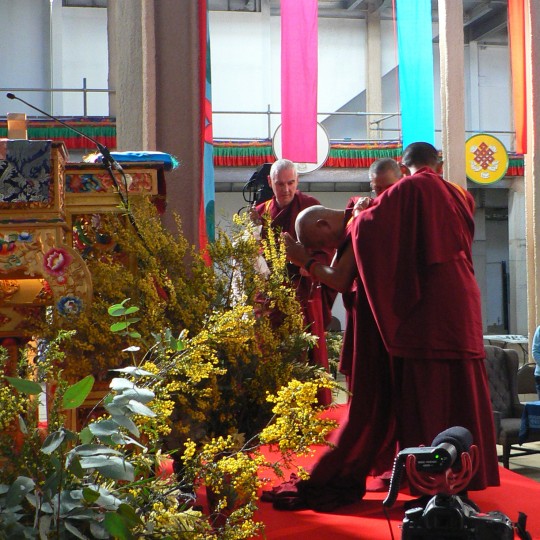
Rinpoche prostrating before offering the body, speech and mind mandala to a photo of His Holiness the Dalai Lama on the throne, Great Stupa of Universal Compassion, Australia, September 2014.
The first day of the CPMT 2014 meeting got off to a blessed start. Representative of the Jaara people, the native Aboriginal tribe of the Bendigo, Victoria, area, performed a smoke ceremony and traditional dances and offered Lama Zopa Rinpoche a traditional sacred gift, representing a connection between the Jaara and the people of the FPMT.
Ven. Gyatso, director of Thubten Shedrup Ling Monastery, which is one of the three FPMT centers hosting the CPMT meeting, welcomed FPMT spiritual director Lama Zopa Rinpoche and Khen Rinpoche Geshe Chonyi, who is the present abbot of Kopan Monastery and resident geshe at Amitabha Buddha Centre. Gyatso recalled how Lama Yeshe had been on the property many years earlier and had pointed out where there was to be a stupa, a monastery, a retreat center and other facilities. And now, Gyatso said many of these things have become or are becoming actualized.
Liam Chambers, director of the Atisha Centre, another of the hosting centers, spoke next, inviting participants to envision an organization “where everyone is being the best that they can be.” He then challenged all present to actually be the best that they can be at the meeting and out in the world. He also recognized the 30 years of work and service offered by people to create and sustain Atisha Centre.
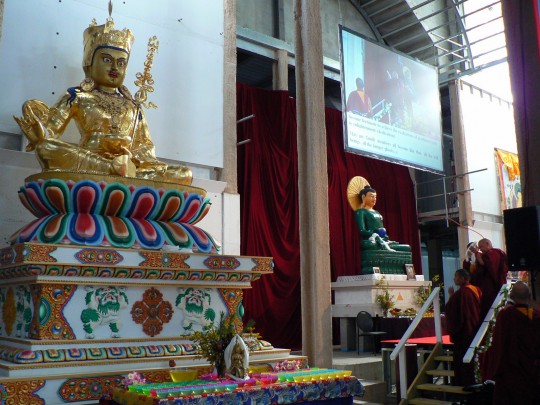
Lama Zopa Rinpoche offering a khata to the Guru Rinpoche statue at the Great Stupa, Australia, September 2014. Photo by Laura Miller.
Judy Green welcomed participants on behalf of the Great Stupa of Universal Compassion. The vast interior of the stupa serves as the venue for the meeting. She also recalled how 33 years ago Lama Yeshe had drawn in the sand his vision for the complex of centers and said, “We’ve done our best to fulfill Lama’s wishes.” She shared how His Holiness the Dalai Lama had blessed the site of the stupa in 2007, saying he saw it as a future gathering place for interfaith and scientific dialogues.
The meeting’s facilitator, Sandra Stubbings, was introduced. Sandra is both a professional facilitator and former SPC of Chang-tong Chen-tong in Tasmania and has completed the 16 Guidelines training (a Universal Education in Compassion and Wisdom program). She has also helped FPMT Australia with its national meetings.
The majority of Day 1 was blessed by Lama Zopa Rinpoche, offering inspiration and advice. In the morning session, Rinpoche gave the motivation for the meeting, which can be watched online. After lunch Rinpoche gave a second talk, speaking on the evolution of FPMT and the special qualities of Lama Tsong Khapa’s teachings, among other things.
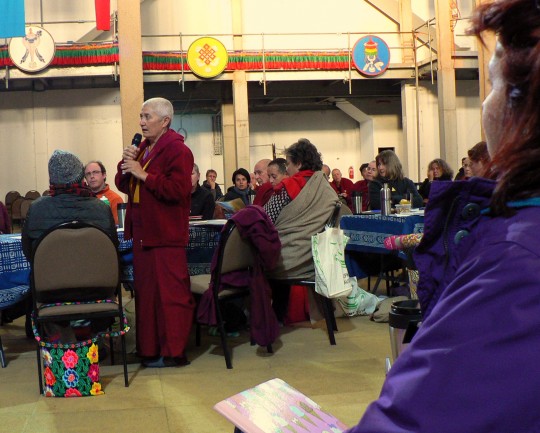
Ven. Paloma Alba sharing ideas from the discussion she had on preserving the Gelug tradition, CPMT 2014, Australia. Photo by Laura Miller.
The day also had many opportunities for participants to talk to each other, including a lunch-time meeting of the national and regional coordinators attending the meeting, who discussed ideas for how to best share and disseminate the information and experience of the CPMT 2014 meeting. After Rinpoche’s afternoon talk, participants had lively and engaged discussions with partners on how to better learn and practice in order to preserve the Gelug tradition, which was a question suggest by Rinpoche. Before going to dinner, ideas on this were shared with the larger group and everyone seemed to have had fruitful discussions.
After dinner, Khen Rinpoche Geshe Chonyi talked about his experience becoming a Kopan monk at the age of 12 in 1974. Khen Rinpoche described life as Kopan and how he was part of the first group of Kopan monks to study at Sera Je. After completing his geshe degree, he said that Lama Zopa Rinpoche asked him to become the resident geshe at Amitabha Buddhist Centre in Singapore in 1999. Khen Rinpoche said that at the time he thought he would “just try it for a year;” the center just celebrated his 15th year as resident geshe.
Khen Rinpoche was asked to become the abbot of Kopan Monastery in 2011, after Khensur Rinpoche Lama Lhundrup manifested advanced cancer. Khen Rinpoche shared how Kopan Monastery has grown over the years and what it offers now. There are about 380 monks and 400 nuns at Kopan and its sister nunnery Khachoe Ghakyil. They receive education in English, science, math and other topics as well as a Buddhist philosophy and other traditional topics. Kopan and Khachoe Ghakyil serve as a source of current and future geshes for FPMT centers around the world, with about 15 geshes so far coming from Kopan. To close, Khen Rinpoche said very humbly, that he was speaking “just as an example of how Kopan benefits people.”
Mandala will continue sharing updates and photos from the CPMT 2014 meeting as it continues.
Mandala brings you news of Lama Zopa Rinpoche and of activities, teachings and events from over 160 FPMT centers, projects and services around the globe. If you like what you read on Mandala, consider becoming a Friend of FPMT, which supports our work.
- Tagged: cpmt, cpmt 2014, lama zopa rinpoche
- 0
12
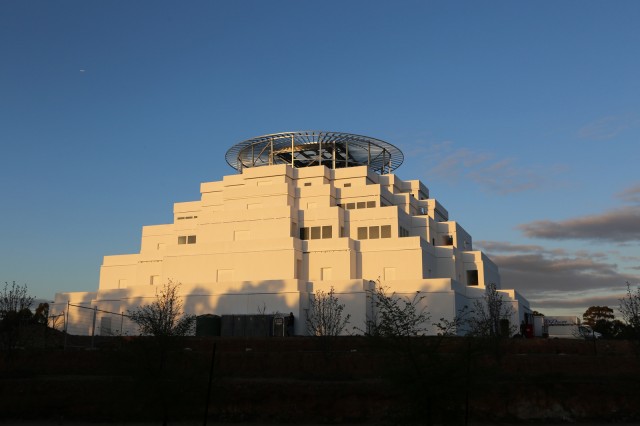
The Great Stupa of Universal Compassion, Australia, September 12, 2013. Photo by Ven. Thubten Kunsang.
Lama Zopa Rinpoche arrived for the five-day CPMT meeting at the Great Stupa of Universal Compassion in Australia on Thursday, September 11. The CPMT meeting begins on September 13, and Rinpoche’s opening talk on Saturday will be streamed live over the internet beginning at 10:15 a.m. local time (AEST, click here for time zone conversions). For up-to-date information on webcasts of Rinpoche while at the Great Stupa, visits the CPMT Livestream page.
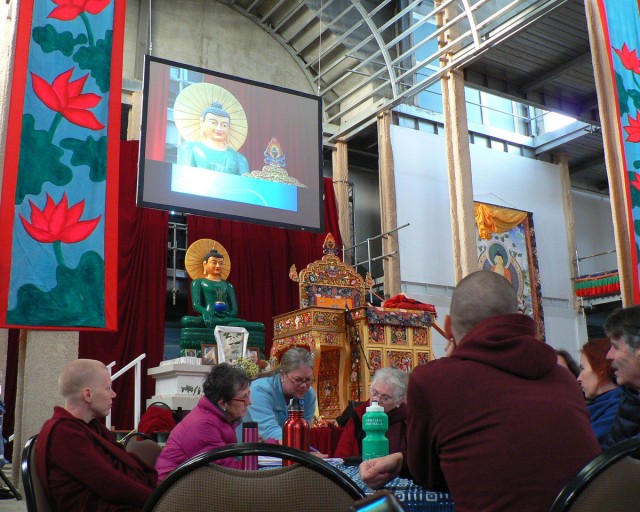
Presenters preparing for the CPMT meeting while the A/V team test the projector, Great Stupa, Australia, September 12, 2014. Photo by Ven. Roger Kunsang.
On Friday, September 12, the Great Stupa was aflutter with preparations. Flowers and water bowl offerings were being arranged. Meeting presenters were reviewing their talks. And the A/V team was setting up and testing microphones, cameras, speakers and a projection screen to ensure that all present – as well as anyone with an internet connection around the world – can see and hear Rinpoche.
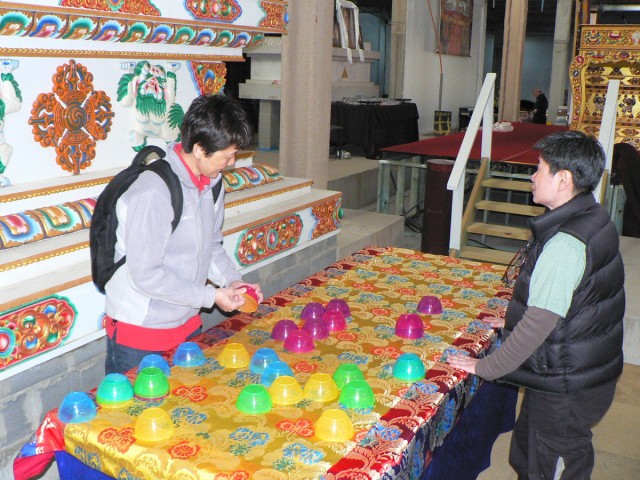
Pik Pin Goh and Sally Ong from Losang Dragpa Centre beginning to set up water bowls in front of the Guru Rinpoche statue in the Great Stupa, Australia, September 12, 2014. Photo by Laura Miller.
The CPMT meeting, which ends on September 19, is followed by a public talk on September 20 and the month-long Bodhicaryavatara and Rinjung Gyatsa retreat, September 25-October 23. The public talk as well as the retreat at the Great Stupa will also be live streamed.
Mandala will be covering the CPMT meeting with daily updates and new photos.
Mandala brings you news of Lama Zopa Rinpoche and of activities, teachings and events from over 160 FPMT centers, projects and services around the globe. If you like what you read on Mandala, consider becoming a Friend of FPMT, which supports our work.
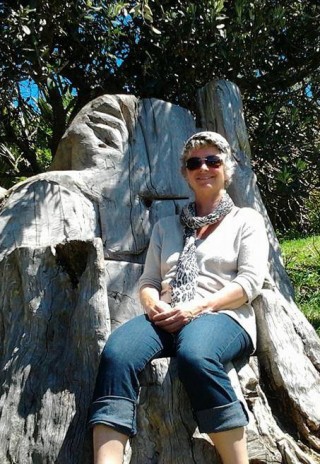
Joop van Herk coordinates Cuppa & Company, a new ‘day-stay’ program by Amitabha Hospice Service. Photo from Facebook.
Director Ecie Hursthouse describes the new caregiver respite program at Amitabha Hospice Service in Auckland, New Zealand:
Amitabha Hospice is very pleased to offer our new “day-stay” program to people living with terminal conditions in Auckland. This new program, called “Cuppa & Company” is held once a week in our hospice. It offers companionship and camaraderie, art classes, music, reiki and other complementary therapies to our patients. The families and caregivers of the patients also benefit by receiving a regular break from what is usually 24/7 caring. Our volunteer coordinator Joop van Herk organizes Cuppa & Company.
The Level 1 NZ Buddhist Chaplaincy Course will be held again at Amitabha Hospice September 5-7 and facilitated by Ecie Hursthouse and Kala Dostal. This course, which is accredited by the NZ Buddhist Council, prepares successful applicants to help support practitioners from any Buddhist tradition (Theravada and Mahayana) in a health crisis. Completion of the course gives the qualification of “NZ Apprentice Buddhist Chaplain.”
Mandala brings you news of Lama Zopa Rinpoche and of activities, teachings and events from over 160 FPMT centers, projects and services around the globe. If you like what you read on Mandala, consider becoming a Friend of FPMT, which supports our work.
- Tagged: amitabha hospice service, mandala
- 0
“If we generate compassion, we become a friend to everybody and everyone becomes our friend. With this positive attitude, compassion, toward everyone, others also become friendly toward us so we receive no harm from them, only benefit, only help. This way, there’s success in our life. …
“… Each of us here is completely responsible for everybody’s happiness, for every sentient being’s happiness. Not only human beings, not only that, but for all the rest of the sentient beings. Each insect we see on the road, each fly, each bird, each dog, each worm we see on the ground, we are responsible. Each of us here is responsible for the happiness of every single sentient being that we see around us in everyday life, starting from that to all the rest of the sentient beings. So, if we don’t practice compassion, if we only follow the ego, the self-cherishing thought, there is danger to others, starting from the family, starting from the people nearest us to all the rest of the sentient beings. They receive harm from us, directly or indirectly, from life to life.”
Excerpted from Lama Zopa Rinpoche’s teachings at the 24th Kopan lam-rim course in Nepal, 1991. These teachings are included in the ebook Practicing the Unmistaken Path: Lam-rim Teachings from Kopan 1991, due out in November from Lama Yeshe Wisdom Archive.
Learn more about Lama Zopa Rinpoche, spiritual director of the Foundation for the Preservation of Mahayana Tradition (FPMT), and Rinpoche’s vision for a better world. Sign up to receive news and updates.
- Tagged: lama zopa rinpoche, universal responsibility
- 0
9
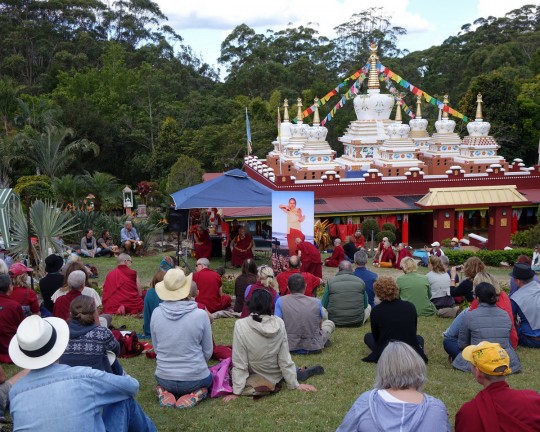
Lama Zopa Rinpoche helps celebrate the 40th birthday of Chenrezig Institute in the Garden of Enlightenment, Eudlo, Queensland, Australia, September 2014. Photo by Ven. Roger Kunsang.
Chenrezig Institute was the first FPMT center in Australia, begun in 1974 after a teaching with Lama Yeshe near Eudlo, Queensland. Today, the thriving center offers a packed program of study, practice and retreat.
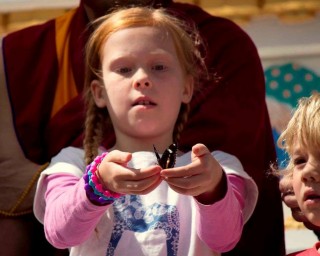
Releasing butterflies at Chenrezig Institute’s 40th birthday celebration, Eudlo, Australia, September 2014. Photo by Kerry Murphy.
During his recent visit to the center, Lama Zopa Rinpoche joined the 40th anniversary celebration held on September 6. In addition to a public talk, “Purification, Healing and Joyful Living,” Rinpoche took part in a butterfly release with the children of the center. Rinpoche also gave a Great Chenrezig initiation while at the center.
In Mandala July-September 2009, we shared the story about how the center came to be. (You’ll also find how the other oldest FPMT centers around the world took root.)
Mandala brings you news of Lama Zopa Rinpoche and of activities, teachings and events from over 160 FPMT centers, projects and services around the globe. If you like what you read on Mandala, consider becoming a Friend of FPMT, which supports our work.
- Tagged: chenrezig institute, lama zopa rinpoche
- 0
8
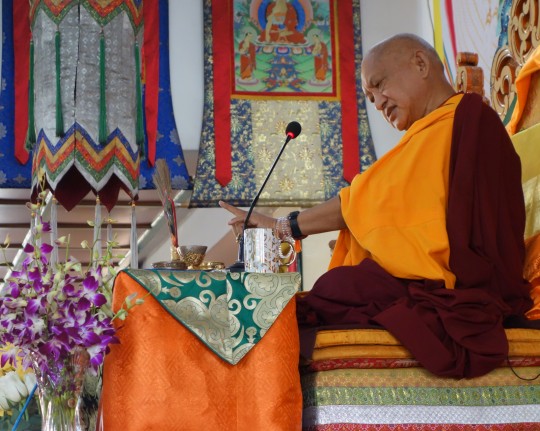
Lama Zopa Rinpoche teaching at the 100 Million Mani Retreat in Mongolia, Ulaanbaatar, Mongolia, August 2014. Photo by Ven. Roger Kunsang.
“Lama Zopa: If you are wise, practice rejoicing in others’ and one’s own good karma. Feel a sense of joy in others’ good deeds and actions.”
– From Ven. Roger Kunsang’s Twitter page, posted on August 30, 2014
Ven. Roger Kunsang, Lama Zopa Rinpoche’s assistant and CEO of FPMT Inc., shares Lama Zopa Rinpoche’s recent pith sayings on Ven. Roger’s Twitter page. (You can also read them on Ven. Roger’s Facebook page.)
More information, photos and updates about FPMT spiritual director Lama Zopa Rinpoche can be found on Rinpoche’s homepage. If you’d like to receive news of Lama Zopa Rinpoche via email, sign up to Lama Zopa Rinpoche News.
- Tagged: lama zopa rinpoche, mandala, rejoice, twitter
- 0
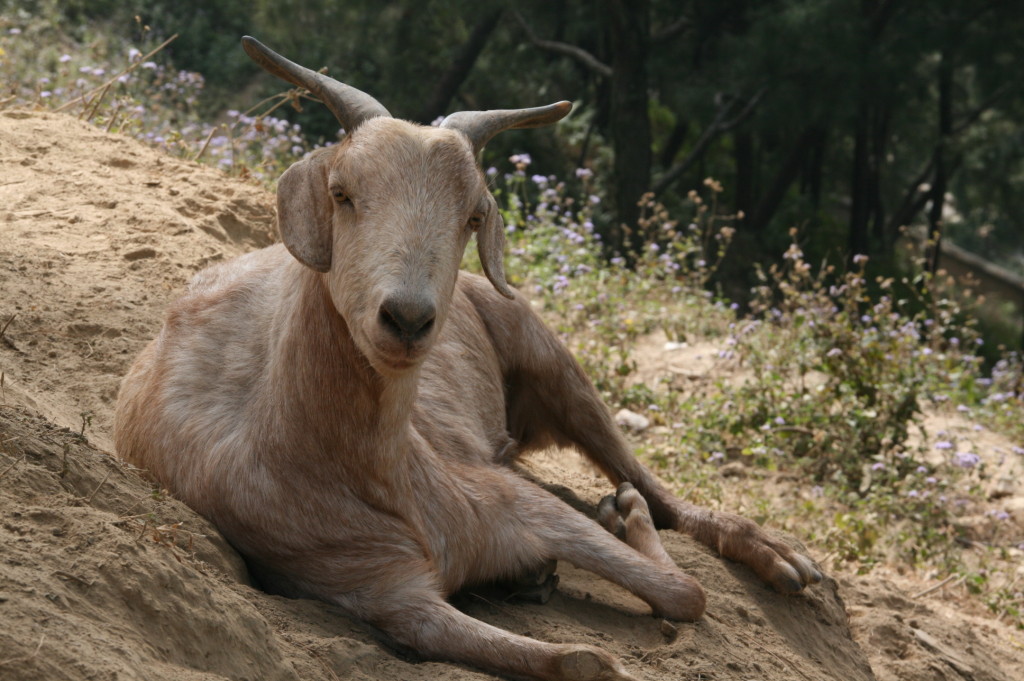
Dzambala benefited from Animal Liberation Sanctuary until his death in March 2013. Photo courtesy of Animal Liberation Sanctuary.
Animal Liberation Sanctuary co-director Phil Hunt sent Mandala a recent update on the animal-welfare projects taking place in Nepal:
The Animal Liberation Sanctuary, Nepal, has experienced its first monsoon on the new land. Fortunately, there are now several dry areas where the goats and sheep can rest, including one of their favorite places, around the stupas which provides some coolness from the heat (not to mention many blessings!).
We had our first operation in our new treatment room, with Nyingjey, a goat, who has had ongoing urinary problems. It has certainly been much less stressful for the animals to have treatment on the property where they live rather than having to transport them all the way into the city and back. Plus, our facilities are a lot cleaner.
We also have two dogs at the sanctuary now, Poppy and Lhamo, since the Nepali caretakers feel safer with dogs. We were also able to spay Poppy in our treatment room whilst we neutered one of the Kopan cats in a room in the Medicine Buddha Clinic. We thank Tree of Compassion, an Australian animal-welfare organization, for donating sterile instruments and materials for surgery, a rarity in Nepali animal care.
Meanwhile, the cows who remain within the monastery grounds at Kopan have more vegetation to eat since there are no longer any goats in their territory to graze it all away. Several of them have had problems with their feet, wounds which have been exacerbated by the wet and muddy ground. Treating the foot of a 500 kg [1,100 lb] cow is not such an easy task but distracting them with a bowl of food and a good scratch under the chin helps! Meanwhile, Christmas, our crippled cow, has been sporting his “wrap-around shades,” modified horse netting, to keep the ferocious flies at bay.
Mandala brings you news of Lama Zopa Rinpoche and of activities, teachings and events from over 160 FPMT centers, projects and services around the globe. If you like what you read on Mandala, consider becoming a Friend of FPMT, which supports our work.
- Tagged: animal liberation sanctuary, mandala, phil hunt
- 0
4
“People use the word ‘happy’ a lot, but what they think is happiness is not real happiness, it is suffering. Therefore, I mentioned that the best happy life, living with compassion, has great meaning. With compassion you can really have a happy life. Happiness can be on different levels. If sentient beings have compassion then they are able to achieve enlightenment and liberate sentient beings from the oceans of samsaric sufferings.”
— Lama Zopa Rinpoche, from the page “Compassion Quotes” on the Lama Yeshe Wisdom Archive
Learn more about FPMT spiritual director Lama Zopa Rinpoche and his beneficial activities by visiting Rinpoche’s webpage, where you will find links to Rinpoche’s schedule, new advice, recent video, photos and more.
- Tagged: lama zopa rinpoche, mandala
- 0
- Home
- News/Media
- Study & Practice
- About FPMT Education Services
- Latest News
- Programs
- New to Buddhism?
- Buddhist Mind Science: Activating Your Potential
- Heart Advice for Death and Dying
- Discovering Buddhism
- Living in the Path
- Exploring Buddhism
- FPMT Basic Program
- FPMT Masters Program
- FPMT In-Depth Meditation Training
- Maitripa College
- Lotsawa Rinchen Zangpo Translator Program
- Universal Education for Compassion & Wisdom
- Online Learning Center
- Prayers & Practice Materials
- Overview of Prayers & Practices
- Full Catalogue of Prayers & Practice Materials
- Explore Popular Topics
- Benefiting Animals
- Chenrezig Resources
- Death & Dying Resources
- Lama Chopa (Guru Puja)
- Lama Zopa Rinpoche: Compendium of Precious Instructions
- Lama Zopa Rinpoche: Life Practice Advice
- Lama Zopa Rinpoche Practice Series
- Lamrim Resources
- Mantras
- Prayer Book Updates
- Purification Practices
- Sutras
- Thought Transformation (Lojong)
- Audio Materials
- Dharma Dates – Tibetan Calendar
- Translation Services
- Publishing Services
- Teachings and Advice
- Find Teachings and Advice
- Lama Zopa Rinpoche Advice Page
- Lama Zopa Rinpoche: Compendium of Precious Instructions
- Lama Zopa Rinpoche Video Teachings
- ༧སྐྱབས་རྗེ་བཟོད་པ་རིན་པོ་ཆེ་མཆོག་ནས་སྩལ་བའི་བཀའ་སློབ་བརྙན་འཕྲིན།
- Podcasts
- Lama Yeshe Wisdom Archive
- Buddhism FAQ
- Dharma for Young People
- Resources on Holy Objects
- Ways to Offer Support
- Centers
- Affiliates Area
- Teachers
- Projects
- Charitable Projects
- Make a Donation
- Applying for Grants
- News about Projects
- Other Projects within FPMT
- Support International Office
- Projects Photo Galleries
- Give Where Most Needed
- FPMT
- Shop
Subscribe to FPMT News
Translate*
*powered by Google TranslateTranslation of pages on fpmt.org is performed by Google Translate, a third party service which FPMT has no control over. The service provides automated computer translations that are only an approximation of the websites' original content. The translations should not be considered exact and only used as a rough guide.We can transform any problem, even death, into happiness. The point is not to stop the experience of problems but to stop the conditions that we call ‘problems’ from disturbing our mind, and instead use them to support the spiritual path that we practice.







